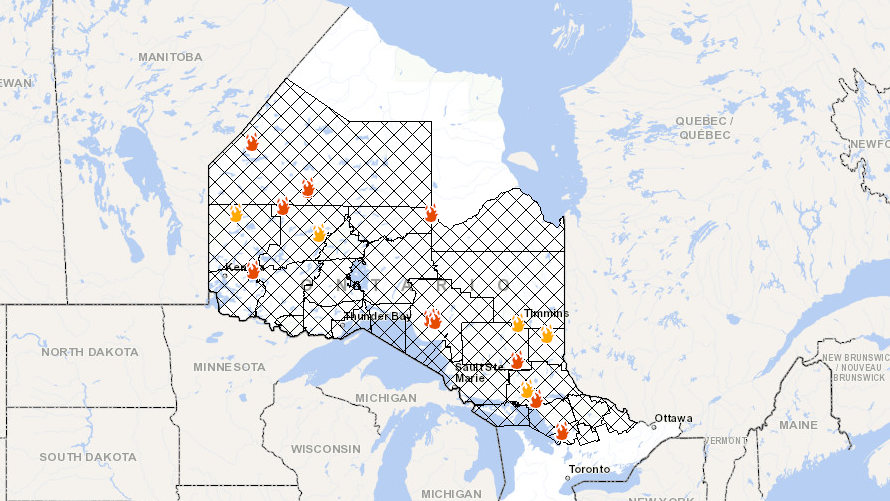Large part of Ontario now under provincial fire ban
A large part of Ontario is under a provincial fire ban due to high risk of forest fires.
As of June 1, most northeastern and northwestern regions of the province have been placed within a Restricted Fire Zone (RFZ), meaning that open fires and the burning of grass or debris are temporarily banned. The idea, officials say, is to prevent human-caused fires at a time in which dry conditions and little precipitation could help the flames spread.
“The chances of wildland fire starting, whether its nature caused or human caused, is much more likely to happen,” Amy Peltonen, a fire information officer with the Aviation Forest Fire and Emergency Services branch of the Ministry of Natural Resources, told CTV News Toronto.
- Download our app to get local alerts on your device
- Get the latest local updates right to your inbox
According to provincial data, there is an extreme danger of forest fires in central and northeastern Ontario, from just north of Sault Ste. Marie all the way to Belleville.
The risks are considered “high” in the Thunder Bay area before dropping to a “moderate” risk further west. A region near Thunder Bay and some of northern Ontario, the risks are considered “high” to “moderate.”
As of around 2 p.m., about a dozen new and active forest fires were reported.
“Right now, we are actually kind of on par for what we've seen compared to last year,” Peltonen said. “So we're not seeing necessarily a bad fire season at this point.
 An interactive map shows Ontario's Restricted Fire Zone as of June 1, 2023.
An interactive map shows Ontario's Restricted Fire Zone as of June 1, 2023.
Peltonen added that current and forecasted wildfires are being “continuously and carefully monitored.”
“Generally, Ontarians don't need to be concerned.”
So far this year, Ontario has reported 78 forest fires in total compared to the 77 fires reported within a similar time frame in 2022.
The provincial 10-year average is about 140 fires.
WHAT DOES BEING WITHIN A RESTRICTED FIRE ZONE MEAN?
Property owners living within these areas should try to keep their lawns mowed and watered, move wood piles and other flammable materials away from structures, and keep conifer trees pruned.
Propane gas or propane stoves may be used but officials warn they should be handled with extreme caution.
A large number of Ontario’s parks have reported fire bans, which means that campers cannot use fire pits, charcoal barbecues or candles.
A list of parks included in the ban can be found on the Ontario Parks website. It includes a number of large parks such as Algonquin, Arrowhead, and Killarney.
There are more than 200 wildfires burning across Canada, officials said Thursday. The government says that so far the blazes have torn through about 27,000 square kilometres of land compared to the 10-year average of 500 square kilometres.
Green Party Leader Mike Schreiner says that Ontarians should brace for a “severe fire season that will once again damage buildings, decimate communities and force many people to evacuate their homes.”
He called on the Doug Ford government to take action on climate change and provide funding for infrastructure while also stopping his plans to expand fossil gas plants.
“The hot weather is just getting started and already forest fires are raging across northern Ontario, while multiple communities sit under extreme fire warning,” he said in a statement.
“This is a matter of environmental injustice. Doug Ford needs to wake up and take action on the climate emergency.”
With files from the Canadian Press.
CTVNews.ca Top Stories

'Mayday! Mayday! Mayday!': Details emerge in Boeing 737 incident at Montreal airport
New details suggest that there were communication issues between the pilots of a charter flight and the control tower at Montreal's Mirabel airport when a Boeing 737 made an emergency landing on Wednesday.
Trudeau appears unwilling to expand proposed rebate, despite pressure to include seniors
Prime Minister Justin Trudeau does not appear willing to budge on his plan to send a $250 rebate to 'hardworking Canadians,' despite pressure from the opposition to give the money to seniors and people who are not able to work.
Hit man offered $100,000 to kill Montreal crime reporter covering his trial
Political leaders and press freedom groups on Friday were left shell-shocked after Montreal news outlet La Presse revealed that a hit man had offered $100,000 to have one of its crime reporters assassinated.
Cucumbers sold in Ontario, other provinces recalled over possible salmonella contamination
A U.S. company is recalling cucumbers sold in Ontario and other Canadian provinces due to possible salmonella contamination.
Trudeau says no question incoming U.S. president Trump is serious on tariff threat
Prime Minister Justin Trudeau says incoming U.S. president Donald Trump's threats on tariffs should be taken seriously.
In a shock offensive, insurgents breach Syria's largest city for the first time since 2016
Insurgents breached Syria's largest city Friday and clashed with government forces for the first time since 2016, according to a war monitor and fighters, in a surprise attack that sent residents fleeing and added fresh uncertainty to a region reeling from multiple wars.
Canada Bread owner sues Maple Leaf over alleged bread price-fixing
Canada Bread owner Grupo Bimbo is suing Maple Leaf Foods for more than $2 billion, saying it lied about the company's involvement in an alleged bread price-fixing conspiracy.
Musk joins Trump and family for Thanksgiving at Mar-a-Lago
Elon Musk had a seat at the family table for Thanksgiving dinner at Mar-a-Lago, joining President-elect Donald Trump, Melania Trump and their 18-year-old son.
Here's how thick ice needs to be to park a truck on it, according to Sask. Water Security Agency
The Saskatchewan Water Security Agency (WSA) says ice should be at least one foot (30 centimetres) thick before it's safe to drive a car or light truck on a frozen body of water.


































